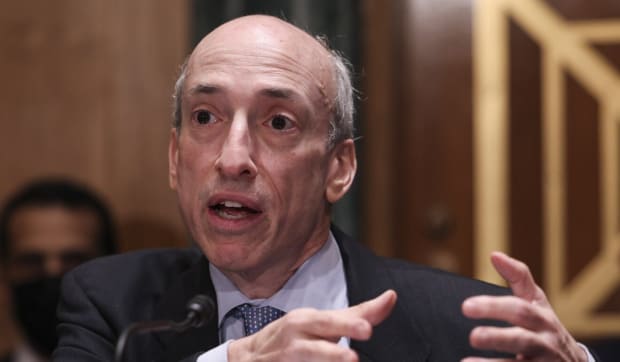
In the language of the cryptocurrency industry players, the new offensive of U.S. regulators can be summed up in one word: crackdown.
The U.S. Securities and Exchange Commission seems determined to impose order with an iron fist on the sector, after years of a laissez-faire approach which has led to fiascos and resounding financial scandals, such as the overnight bankruptcy of the empire of the king of crypto Sam Bankman-Fried. His empire consisted of the FTC cryptocurrency exchange and its sister company Alameda Research, a trading platform.
Before FTX filed for bankruptcy last November, sister tokens Luna and UST collapsed in May 2022, triggering a credit crunch that put crypto lenders Celsius Network and Voyager Digital out of business. Billions of dollars have been wiped out in these scandals, leaving a bitter taste for millions of investors, including retail investors.
DON'T MISS: Intel Slashes Dividend Following Frim Profit Outlook; Stock Slides
When these scandals broke, the question that came up the most was where the regulators were to protect clients or investors.
There's a Sheriff in Town
The SEC now seems determined to show that there is a sheriff in town.
The federal agency is more targeting coins and less practices of firms. The regulator wants to put all cryptocurrencies in the securities category, which would give it a lot of power over the industry.
A security is, according to the agency, "an investment of money, in a common enterprise, with a reasonable expectation of profit derived from the efforts of others.”
The regulator wants to refer to a Supreme Court judgment of 1946, the Howey Test, that sets out what is an "investment contract" and would therefore be subject to U.S. securities laws. An investment contract exists if there is an investment of money with expectations of profits.
Tokens, or coins, until now have not been considered securities. This means that they escape strict regulatory supervision and are not subject to the same rules of financial transparency and disclosure, as, for example, shares in a company would be. The listing process for tokens is also less strict than that for securities.
Market participants supervised by the SEC are subject to strict rules of disclosure, risk management, minimum liquidity levels, and more.
Gary Gensler, the SEC chair, has recognized that certain tokens, including bitcoin, might not be considered securities.
But he has focused on the so-called stablecoins, which are pegged to other assets, like the dollar, in an effort to limit their volatility.

Going After Stablecoins
Stablecoins are widely used by many institutional investors who see them as a way to invest in the crypto industry, while protecting themselves from high market volatility. They can thus move large sums of money around the world in one click, without having to go through banks.
In addition to the ease of moving large funds, stablecoins also offer the advantage that their value does not change. Investors who put their money there, are sure that they will get the same amount when they withdraw or move them. Which is not the case with fiat currencies and other coins like bitcoin, as their price evolves according to different micro, macro and other factors.
For firms issuing stablecoins, the advantage is that they can use this money to invest in corporate debt and other financial instruments to earn money.
The problem with stablecoins is that there are doubts about the assets supporting them or the reserves of the firms issuing them. Basically, if investors decide to withdraw their funds, will the firm be able to meet their demands?

Shutterstock
By targeting stablecoins, the SEC wants to send a message that no player, however big, is immune to regulation. The SEC has thus warned the firm Paxos Trust that it will take enforcement action against its stablecoin BUSD which, according to the regulator, violates the laws protecting investors.
By this language, the SEC means that they consider BUSD to be a security, which Paxos disputes. This action should materialize in the form of a complaint by the SEC against Paxos, to force the firm to eventually negotiate.
"We believe unequivocally that BUSD is not a security," Paxos CEO and co-founder Charles Cascarilla told employees in an internal note on Feb. 16. "Our stablecoins are always backed by cash and equivalents – dollars and US Treasury bills, but never securities."
He continued: "We are engaged in constructive discussions with the SEC, and we look forward to continuing that dialogue in private. Of course, if necessary, we will defend our position in litigation."
The Crypto Industry Pushes Back
A complaint from the SEC is likely to pose a problem or even resolve the question of whether stablecoins can be considered securities, when their investors do not hope to make any profit from them, because their value does not vary unlike other cryptocurrencies.
It is this argument that industry players based their pushback on.
"Bad actors need to be held accountable. But targeting an entire legal, and indeed highly regulated industry is no answer," said Coinbase Chief Legal Officer Paul Grewal in a tweet.
The platform, which is a public company, has previously revealed that one of its products which is linked to USDC, a stablecoin in partnership with the firm Circle, was also under investigation by the SEC.
The SEC's problem is that other federal agencies view stablecoins differently. The Commodity Futures Trading Commission and the New York State Department of Financial Services have labeled tether and BUSD as "virtual currencies."
So which approach will prevail?
In addition to stablecoins, the SEC has recently taken aim at lending-related crypto products commonly known in the industry as staking, a way in which investors lock up – or stake – their crypto tokens with a blockchain validator. The goal is to be rewarded with new coins when their staked crypto tokens become part of the process for validating data on the blockchain.
Only blockchains that use the proof-of-stake validation mechanism -- such as ethereum, solana, cardano and tezos -- to ensure that transactions are verified and secured without a bank or payment processor in the middle, allow staking.







